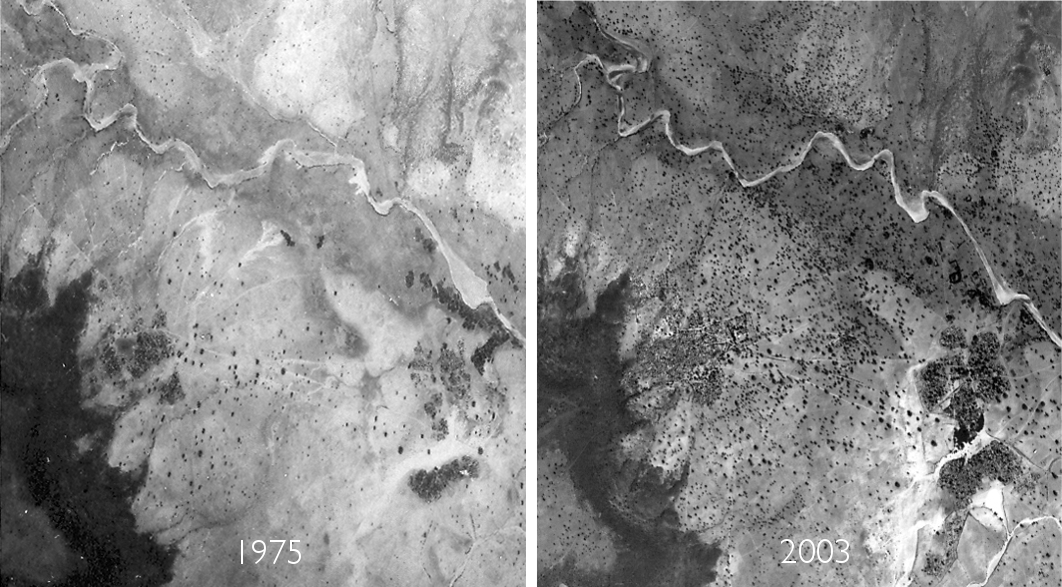By Tim Morris
The third volume of the IPCC assessment report has been released in Berlin on 13 March. It confirms the need for immediate intervention in order to reduce the sources and enhance the sinks of greenhouse gases. World Vision Australia is already contributing to the global challenge with an integrated approach that benefits the environment and improves the livelihoods of the poorest.
People often wonder why a not-for-profit organisation such as World Vision Australia, whose primary focus is poverty alleviation, is involved in programmes that relate to climate change. Climate may appear to be purely an issue of science and environment that has little to do with the economic hardship of the poorest populations across developing countries. One might think that hungry childrens’ primary needs are not sustainable reforestation or efficient energy projects, and that they will not benefit from them. Or, will they?
The link between economic development and climate change is a strong one, although perhaps not immediately evident. The latest reports from the Intergovernmental Panel on Climate Change (IPCC) help to explain why this is the case. In early April the IPCC released a report highlighting how the impact of climate change will hit vulnerable populations hardest. Communities of people who live in poverty do not have the resources to cope with an increasingly uncertain environment. This is especially true for women and children, who tend to have fewer means and tend to be the most vulnerable members of these communities. The new IPCC report, released to the public in Berlin on 13 March, has further elaborated on this point by stressing the need for climate policies that have sustainable development and equity at their core. Some of the report’s key conclusions are:
- Substantial reductions in emissions would require large changes in investment patterns.
- The most cost‐effective mitigation options in forestry and agriculture include afforestation, sustainable forest management and cropland/grazing land management.
- Limiting the effects of climate change is necessary to achieve sustainable development and equity, including poverty eradication.
But, how can climate policies help in reducing poverty?
Climate mitigation and adaptation policies have the potential to generate a positive spill over effect into various aspects of a society, including health, energy and food security. Supporting local communities in their efforts to mitigate and adapt to the changing climate can therefore create numerous benefits for the life of community members. Agriculture is probably one the most relevant examples. There is growing evidence and an increasing number of success stories about how subsistence farmers have improved their agricultural output and enhanced their financial income by restoring land and growing trees on their farms. As a consequence, women and children are increasingly freed from heavy work duties and can have increased access to food – education becomes more affordable and poverty eradication a realistic goal. In the process, several tons of carbon dioxide are sequestered, contributing to reducing global emissions.

Increase in tree cover in southern Niger
The financial flow towards mitigation and adaptation policies aimed at enhancing resilience to climate change and reducing greenhouse gas emissions has become larger over the past few years. However, too small a fraction of the total funds is directed to developing countries, where the human costs are likely to be much higher. World Vision Australia is working to implement mitigation and adaptation projects through an integrated approach that improves the livelihoods of the most vulnerable communities in the developing world. We are aware that climate change is a global challenge with varying local impacts. Our projects are designed to primarily address the local level, providing people with the means to satisfy their immediate needs in terms of food security, income, clean energy and health. But by doing so, we are also making our contribution to building a path of sustainable development that will benefit the world’s climate.
The IPCC report indicates that focusing on fair and just climate policy is a necessary step and that it is not too late to act. World Vision Australia is committed to tackling the climate challenge by acting now and by making a difference in the lives of vulnerable people.

Tim Morris is the Business Unit Manager for the Food Security and Climate Change team at World Vision Australia
Related Pages:
IPCC report says today’s choices will affect near-term climate effects
IPCC Fifth Assessment Report (AR5)
